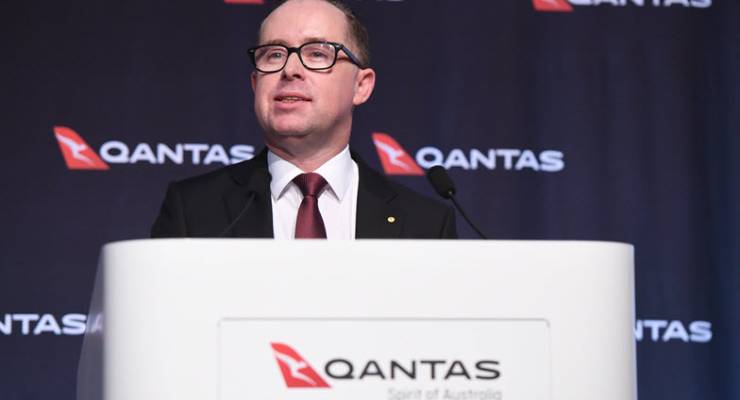
Australia’s big business is tired of being your whipping boy, thank you. They’ve dispatched Jennifer Westacott, Chief Executive of the Business Council, to run a “poor us” media campaign on behalf of Australia’s and the world’s biggest companies. And they’ve hit back at the criticism that many pay no tax.
One of the attacks on the ABC’s Emma Alberici was from Qantas’ Alan Joyce, who cried that “if you don’t make money you don’t pay the tax … That is the way the system works. It allows companies to take a huge loss and digest that over time.” That is indeed the way the system works: incur a big loss or massive writedown, and you get to offset it against future profits. Some companies, like Qantas, go on “digesting” losses over years, avoiding paying tax on current profits.
For companies affected by external factors over which they have little control — such as resources companies, which are hostage to global commodities prices — writedowns and losses offsetting abnormal profits generated by market cycles are an effective way of reflecting their true profitability for the purposes of taxation.
But writedowns and losses are also a handy way to get taxpayers to subsidise your worst mistakes. Take Alan Joyce, pointing to how “we had the union dispute in 2011-12, which cost the company a lot of money”. Except, Joyce’s “union dispute” was an outright attack on workers designed to weaken their capacity to protect their pay and conditions — the sort of thing that has delivered us years of stagnant wages growth. Luckily, though, taxpayers have helped offset the cost of that decision by allowing Qantas to use those losses against future profits.
Thank you, taxpayers.
And while resources companies are hostage to the commodities cycle, they too make awful decisions. In the last decade, BHP has written down US$20 billion due to its US shale gas investments; Rio Tinto’s Alcan and Mozambique coal purchases (the latter is the subject of an SEC fraud prosecution in the US) cost it upwards of US$25 billion over the past decade. And there are plenty of examples elsewhere.
NAB and ANZ wrote off hundreds of millions in foolish offshore ventures. There’s Wesfarmers’ billion-dollar writedowns of its UK hardware venture, Target, and coal mines, and Woolworths’ $3.2 billion losses in hardware. Origin Energy, under now Business Council president Grant King wrote off billions. QBE has reported $5 billion or more in impairments on offshore operations in the past half a dozen years, News Corp and Fairfax Media have taken several billion dollars in impairments and writedowns on overvalued assets, staff cuts and more.
In fact the media is replete with examples. Seven West Media was valued at $4.1 billion when Kerry Stokes brought Seven Network and West Australian Newspapers together. Yesterday, that company was valued at less than $800 million. Seven West has been forced to make massive write-downs in the past few years. And Ten Network lost over $1.2 billion in value from 2011 onwards to its implosion last June, thanks to the incompetence of its media mogul owners.
And then there are multinational companies in intellectual property-based sectors like tech, which use IP fees to reduce how much profit they report in any particular country. Or the multinationals that lend money internally at higher interest rates to curb profits, or sell products to subsidiaries at inflated costs. Or otherwise engage in the myriad ways that cross-border entities can shift profits out of a country without being taxed, despite generating huge revenues in places like Australia.
The Turnbull government — building on measures announced by Joe Hockey before he lost his job — has curbed some of the opportunities for profit shifting, but many companies still have considerable flexibility about how much profit they report (a quick squiz at journalist Michael West’s excellent site will identify some of the worst offenders).
That’s why in 2015-16, companies in Australia earning more than $100 million on average paid just 2% of their revenue in tax. That’s a figure dismissed as “ignorant” by company tax cut spruikers. But it’s only ignorant if you think our tax system doesn’t give many companies the chance to artificially lower their profits, and subsidise rotten decisions for years afterward.









Lots of good points here but the last comment about tax paid as a proportion of revenue is not one of them. Companies in different businesses may have vastly different profit margins – say Woolworths small margins vs Telstra which has many times greater margins on revenue – so income tax which is on profit cannot be measured as a proportion of revenue. What matters most to a company is return on equity, not necessarily return on revenue.
People can’t tell Centrelink to pay them welfare because they did not make a profit if they are earning, and yet this is what companies do with the ATO.
What? A loss isn’t a loss if it’s the result of a management mistake? BHP didn’t really lose the $20 billion that it wrote down?
Maybe the tax system should be changed so that companies pay tax on the profit they should have made rather than the profit they did make. And let’s put Messrs Dyer and Keane in charge of deciding how much profit each company should have made. You can bet companies would pay their fair share of tax then
I can’t get away with paying no tax on my (hypothetical) $100,000 income this year because for the last few years I didn’t earn anything.
Tax gross revenue perhaps.
I’m a self funded retiree and proud that I pay more tax than Qantas, Mobil Exxon, and Rupert Murdoch’s NewsCrap organisation to name just a few of the many combined.
Tax turnover and charge a Tobin tax on capital flow.